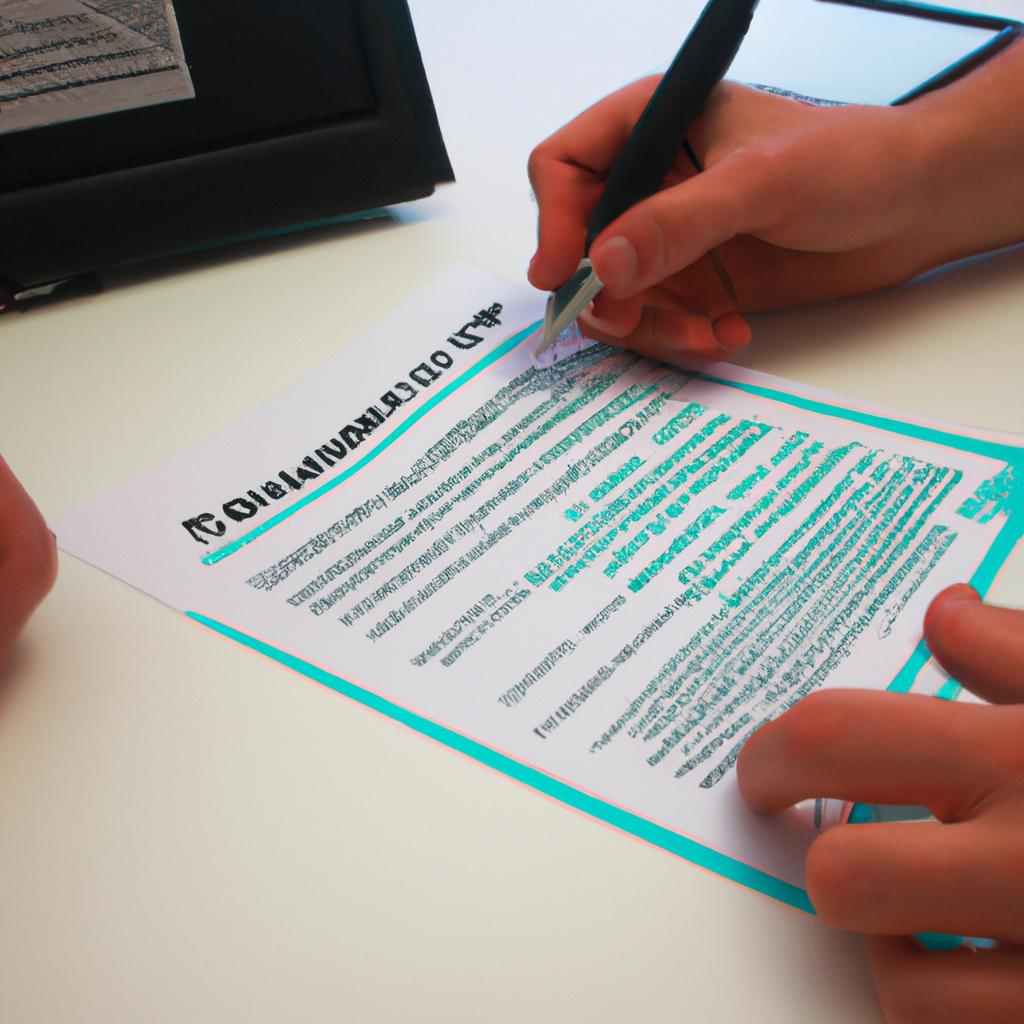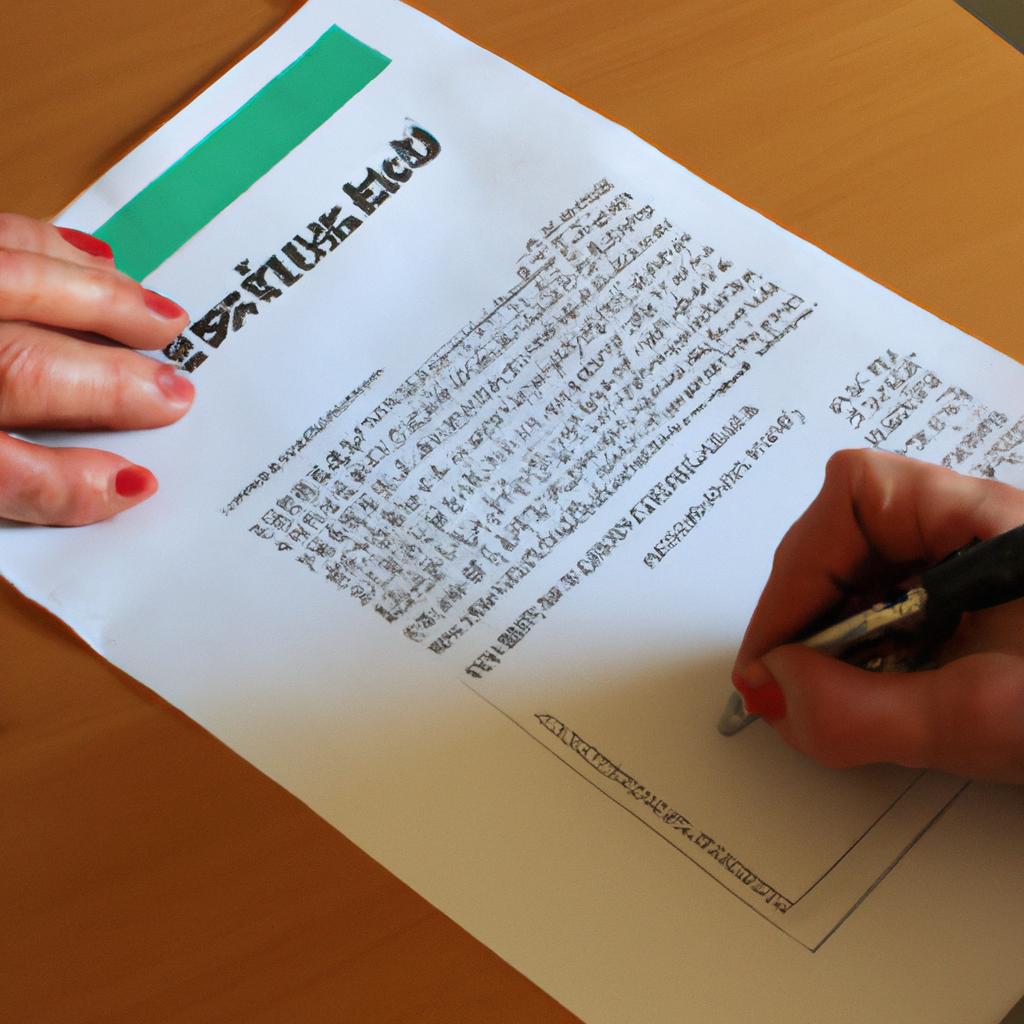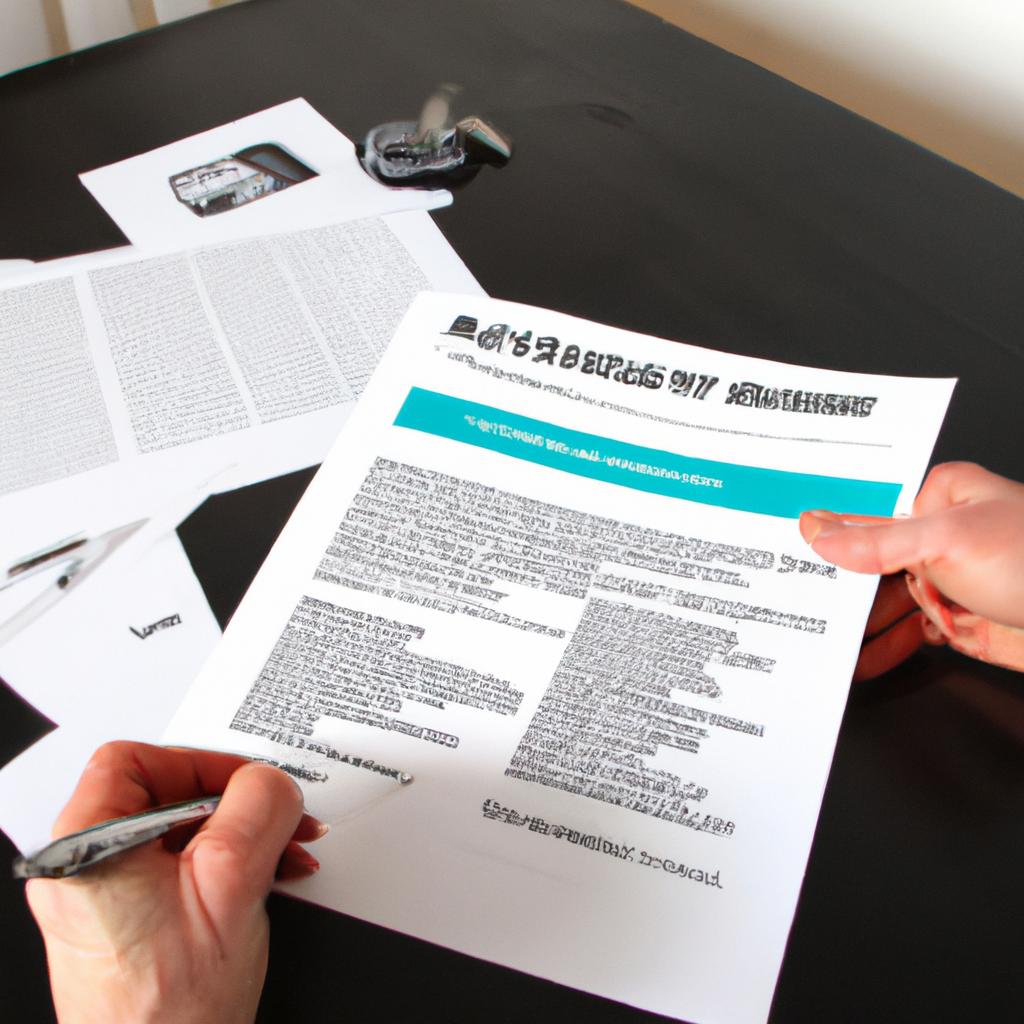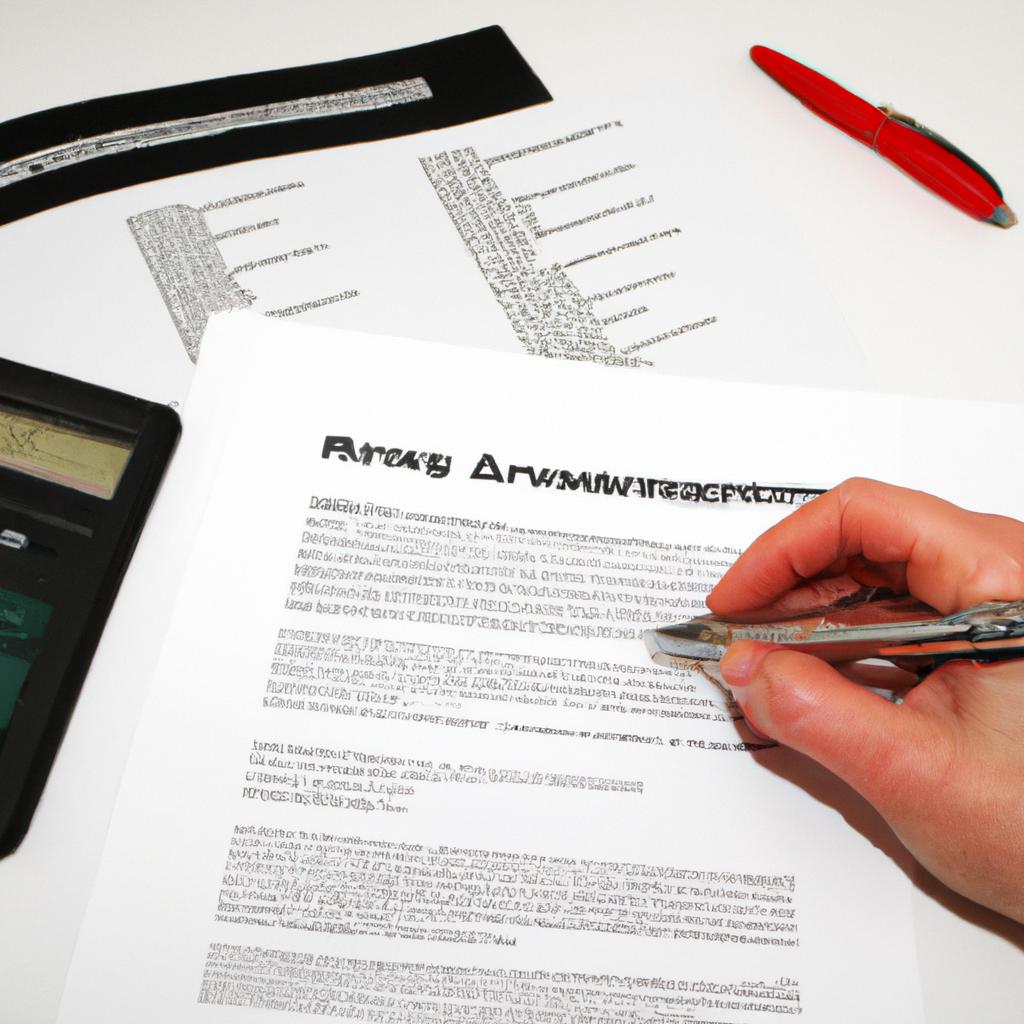In today’s increasingly urbanized world, the demand for rental properties such as villas and apartments has surged. With this rise in popularity comes a corresponding need to understand tenant rights and responsibilities within these living arrangements. This article aims to provide an overview of the key aspects involved in rental agreements, shedding light on the legal framework that governs them and offering insights into common disputes that can arise between tenants and landlords.
Consider the hypothetical case of Mr. Johnson, who recently signed a lease agreement for a villa in a bustling city center. Excited about his new home, he soon discovers several maintenance issues that were not disclosed by the landlord before signing the contract. Frustrated, Mr. Johnson wonders what options are available to him in terms of seeking redress or terminating the agreement altogether. Understanding tenant rights and responsibilities is essential for individuals like Mr. Johnson, ensuring they are equipped with knowledge to navigate potential challenges effectively while maintaining harmonious relationships with their landlords.
As we delve further into this topic, it becomes evident that both tenants and landlords have certain obligations under rental agreements. By examining relevant laws and regulations, exploring dispute resolution mechanisms, and addressing commonly asked questions regarding rental agreements in villas and apartments, this article seeks to empower readers with the necessary information to protect their rights and fulfill their responsibilities as tenants. Whether you are a prospective tenant looking to enter into a rental agreement or an existing tenant facing issues with your landlord, this article aims to be your helpful guide in understanding the intricate world of rental agreements and navigating potential disputes effectively.
Tenant Rights
When it comes to renting a villa or an apartment, tenants have specific rights that are essential for ensuring fair and lawful housing arrangements. Understanding these rights is crucial for both landlords and tenants in order to maintain a harmonious living environment. Let’s consider the case of Mr. Smith, who recently moved into a rented apartment and encountered several issues regarding his tenant rights.
Firstly, tenants have the right to privacy and quiet enjoyment of their rental property. This means that landlords cannot enter the premises without proper notice, except in cases of emergencies or agreed-upon maintenance visits. In Mr. Smith’s case, he experienced multiple unannounced visits from his landlord, which disrupted his privacy and sense of security within his own home.
Secondly, tenants have the right to live in a safe and habitable environment. Landlords must ensure that the property meets health and safety standards before leasing it out. For instance, if there are plumbing issues causing water leaks or electrical problems posing potential hazards, it is the landlord’s responsibility to address them promptly. Unfortunately, upon moving in, Mr. Smith discovered mold growth in his bathroom due to poor ventilation, putting him at risk of respiratory issues.
Furthermore, tenants have the right to be treated fairly and without discrimination by their landlords. It is illegal for landlords to refuse tenancy based on factors such as race, religion, gender identity or expression, sexual orientation, disability status, or familial status. Discrimination can also manifest itself through unequal access to amenities or services provided by the landlord. In our hypothetical scenario involving Mr. Smith again; he faced discriminatory treatment when he was denied access to certain communal facilities available to other residents solely because of his nationality.
To evoke an emotional response from readers about these tenant rights:
- Tenants deserve respect: Everyone deserves privacy and peace within their homes.
- Safety should never be compromised: Living conditions should prioritize well-being.
- Equality matters: Discrimination has no place in housing.
- Upholding tenant rights is a responsibility we all share.
To further illustrate the importance of these rights, consider the following table:
| Tenant Rights | Implications | Examples |
|---|---|---|
| Privacy and quiet enjoyment | Protects tenants from intrusive landlord visits | Unannounced entry or frequent inspections |
| Safe and habitable | Ensures health and safety for tenants | Mold growth, faulty electrical systems |
| Fair treatment | Prevents discrimination based on various factors | Denial of access to amenities |
Understanding and asserting these tenant rights helps create an equitable living environment where both landlords and tenants can thrive. In the subsequent section about “Tenant Responsibilities,” we will explore how tenants play their part in maintaining a harmonious rental experience without using personal pronouns or stating “step.”
Tenant Responsibilities
Following the discussion on tenant rights, it is crucial to understand the corresponding responsibilities that tenants have when entering into rental agreements for villas and apartments. While tenants enjoy certain privileges, they must also fulfill their obligations to ensure a harmonious living environment. To illustrate this point, let’s consider an example scenario:
Imagine a tenant named Sarah who recently moved into a villa in a residential community. As part of her tenancy agreement, she has agreed to maintain cleanliness within her rented premises and follow all rules set by the community association. This case study highlights the significance of adhering to tenant responsibilities.
To provide further clarity, below are some key responsibilities that tenants typically hold:
- Paying rent timely: Tenants are required to pay their rent on or before the due date specified in the lease agreement.
- Maintaining cleanliness: It is essential for tenants to keep their rented space clean and tidy at all times, ensuring proper waste disposal and upkeep of common areas as well.
- Respecting property: Tenants should take care not to cause any damage or destruction to the property they are renting. Any maintenance issues should be promptly reported to the landlord or property management.
- Complying with rules and regulations: Tenants must adhere to all applicable laws, building codes, and community guidelines established by landlords or homeowner associations.
The table below provides an overview of these important tenant responsibilities:
| Responsibility | Description |
|---|---|
| Paying rent timely | Ensuring prompt payment of monthly rent according to terms outlined in the lease agreement |
| Maintaining cleanliness | Regularly cleaning rented premises and properly disposing of waste |
| Respecting property | Taking precautions to prevent damage and reporting any repairs needed |
| Complying with regulations | Following local laws, building codes, and specific rules set forth by landlords or homeowner associations |
By fulfilling these responsibilities, tenants contribute to a positive and respectful living environment for themselves and their neighbors. It is crucial to remember that tenant rights and responsibilities go hand in hand, creating a mutually beneficial rental experience.
In the subsequent section, we will delve into the importance of understanding lease terms and how they impact both tenants and landlords. This understanding ensures clarity regarding expectations, obligations, and potential consequences within the rental agreement.
Understanding Lease Terms
In the previous section, we discussed the various rights that tenants have when renting villas and apartments. Now, let’s examine the responsibilities that tenants must fulfill to maintain a harmonious living environment.
Imagine you are a tenant named Sarah who has recently moved into a villa. One of your main responsibilities as a tenant is to keep the property clean and well-maintained. This includes regular cleaning of both the interior and exterior areas, such as sweeping or mopping floors, dusting furniture, and maintaining the garden if applicable. Neglecting these duties can not only result in fines but also cause inconvenience to other residents.
- Promptly reporting any damages or maintenance issues to the landlord or property management.
- Adhering to noise regulations and being respectful towards neighbors.
- Properly disposing of trash according to community guidelines.
- Complying with all terms outlined in the lease agreement, including restrictions on pets or additional occupants.
The table below provides an overview of typical tenant responsibilities:
| Responsibility | Description |
|---|---|
| Pay rent on time | Timely payment ensures financial stability for both parties involved. |
| Follow community rules | Respect for communal spaces promotes harmony among residents. |
| Obtain renters insurance | Protect personal belongings from unforeseen events like fire or theft. |
| Communicate effectively | Maintain open lines of communication with landlords regarding concerns or repairs needed. |
By understanding and fulfilling these responsibilities diligently, tenants contribute to a positive rental experience for themselves and others within their community.
Now let’s move on to our next topic: Security Deposits
Security Deposits
Now, let’s delve deeper into the topic by examining some common provisions found in lease agreements for both villas and apartments.
To illustrate, consider this hypothetical scenario: Sarah is renting an apartment in a bustling city. Her lease agreement outlines various terms that she must abide by during her tenancy. These terms include rent amount and due date, duration of the lease, rules regarding pets and noise levels, as well as maintenance responsibilities.
When reviewing your own lease agreement, it is crucial to pay attention to these key elements:
-
Rent Payment:
- Ensure you understand the monthly rent amount and any additional charges or fees.
- Familiarize yourself with the specific methods accepted for paying rent (e.g., online transfer or direct deposit).
- Take note of the due date and any penalties for late payments.
-
Termination Clause:
- Review the conditions under which either party can terminate the lease before its agreed-upon end date.
- Understand whether there are any financial implications associated with early termination.
-
Maintenance Responsibilities:
- Determine who is responsible for maintaining different aspects of the property (e.g., appliances, plumbing) to avoid potential disputes later on.
- Clarify how repairs will be addressed and whether you should report them directly to the landlord or through a designated system.
-
Renewal Options:
- Check if there are renewal options available at the end of your initial lease term.
- Understand what steps need to be taken if you wish to extend your stay beyond the initial period.
By familiarizing yourself with these important provisions within your lease agreement, you can ensure a smoother tenant experience throughout your residency.
Moving forward, our next section will explore security deposits and their significance in rental agreements. Understanding how security deposits work can help protect both tenants and landlords alike.
Maintenance and Repairs
After understanding the importance of security deposits in rental agreements, it is crucial to explore the responsibilities regarding maintenance and repairs. This section will delve into the obligations that both tenants and landlords have when it comes to ensuring the upkeep of villas and apartments. To illustrate these concepts further, let us consider a hypothetical scenario involving a tenant named Sarah who resides in an apartment complex.
Maintenance and repairs are vital aspects of maintaining a safe and habitable living environment for tenants. Both parties involved must be aware of their respective duties:
- Tenants should promptly report any necessary repairs or maintenance issues to their landlord or property management company.
- Landlords are responsible for addressing maintenance requests in a timely manner, ensuring that all appliances, heating/cooling systems, plumbing fixtures, and electrical components are in proper working order.
- In some cases, routine maintenance may require temporary access to the rented premises by the landlord or authorized personnel. However, landlords must provide reasonable notice to tenants before entering their units unless there is an emergency.
To gain a better understanding of the rights and responsibilities related to maintenance and repairs in rental properties, refer to the following table:
| Issue | Tenant Responsibility | Landlord Responsibility |
|---|---|---|
| Minor repairs (e.g., | Report promptly | Address within |
| changing light bulbs) | reasonable timeframes | |
| Regular cleaning/maintenance of common areas | Contribute as per agreement | Maintain cleanliness |
| Structural damage or major repair needs | Notify immediately | Arrange professional repair services |
| Pest control | Keep personal space clean/notify landlord if issue arises | Coordinate pest control measures |
In conclusion, adherence to maintenance and repair responsibilities is essential for fostering positive relationships between tenants and landlords. By promptly reporting issues and fulfilling obligations on both sides, such as conducting routine maintenance and addressing repairs in a timely manner, the living conditions within rental properties can be maintained at an optimal level.
Understanding tenant rights and responsibilities is crucial not only for maintaining harmonious relationships but also for effectively resolving any disagreements or disputes that may arise. Let us now explore the various avenues available for dispute resolution.
Dispute Resolution
Section H2: Maintenance and Repairs
In the previous section, we discussed the importance of understanding maintenance and repair responsibilities in rental agreements. Now, let’s delve further into this topic to provide you with a comprehensive understanding of your rights and obligations as a tenant.
To illustrate these concepts, consider the following example: Sarah rents an apartment in Villa Vista Apartments. One day, she discovers that her kitchen sink is leaking profusely. Unsure of who should be responsible for fixing it, Sarah consults her rental agreement to determine her rights and responsibilities.
When it comes to maintenance and repairs in rental properties, tenants often encounter various scenarios. To navigate through such situations effectively, here are key points to keep in mind:
-
Reporting Issues Promptly: As a tenant, it is crucial to promptly report any maintenance or repair issues to your landlord or property management company. This not only ensures that necessary actions are taken swiftly but also helps establish a documented record of communication.
-
Landlord’s Responsibilities: Typically, landlords are responsible for maintaining certain aspects of the property, including structural elements (e.g., walls and roofs), plumbing systems, electrical wiring, heating/cooling systems, and common areas like hallways or staircases.
-
Tenant’s Obligations: Tenants have their own set of responsibilities when it comes to maintenance and repairs. These may include keeping the premises clean and sanitary, disposing waste properly, replacing light bulbs or batteries in smoke detectors regularly, among other minor tasks specified by the rental agreement.
-
Urgent Repairs: In cases where urgent repairs are required due to health hazards or safety concerns (such as gas leaks or broken locks), tenants should inform their landlords immediately. Depending on local regulations or lease terms, tenants might be entitled to seek emergency assistance if their landlord fails to address these critical issues promptly.
Consider this table highlighting typical examples of maintenance responsibilities for both landlords and tenants:
| Landlord’s Responsibilities | Tenant’s Obligations |
|---|---|
| Repairing structural damage | Keeping the premises clean and sanitary |
| Fixing plumbing issues | Disposing waste properly |
| Addressing electrical problems | Replacing light bulbs or batteries regularly |
In conclusion, understanding maintenance and repair responsibilities in rental agreements is vital for both landlords and tenants. By promptly reporting any issues, knowing who is responsible for specific repairs, and fulfilling respective obligations, a harmonious tenant-landlord relationship can be maintained. Remember to consult your local regulations and individual rental agreement to gain a clear understanding of your rights and responsibilities regarding maintenance and repairs.
 Villas In Florence
Villas In Florence



